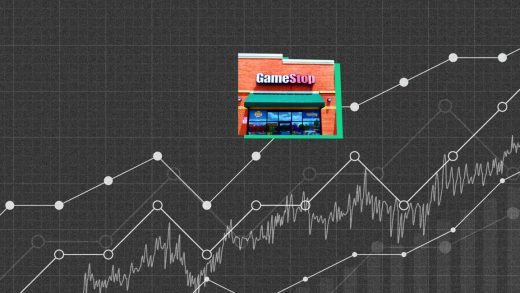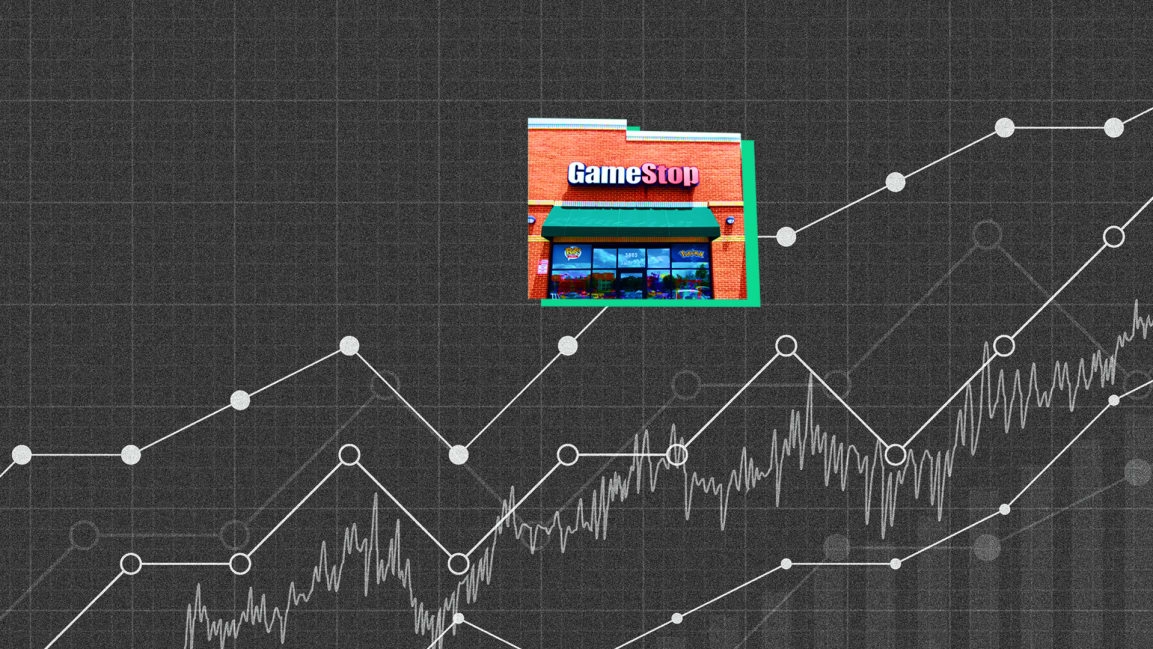GameStop’s wild stock surge won’t stop it from being the next Blockbuster
Shares of the video game retailer climbed as high as $247 in after-hours trading on Tuesday, up from around $18 per share just a couple of weeks ago. The spike is almost entirely due to a game of brinksmanship between Wall Street firms and individual investors, egged on through forum posters on Reddit.
But when the dust settles on this whirlwind of stock market drama, it’ll almost certainly have no bearing on GameStop’s actual business. Experts say that no matter where GameStop’s stock price ends up, it’ll ultimately remain a struggling seller of packaged video games whose turnaround plan looks like a long shot. That’s what makes this whole episode so bizarre to begin with. (GameStop did not respond to a request for comment.)
“Nothing that GameStop has done warrants this,” says Michael Futter, a game industry analyst and founder of the consulting firm F-Squared.
A BASIS FOR GROWTH
GameStop’s initial surge wasn’t entirely unmoored from reality. Until earlier this month, the stock had been enjoying modest growth thanks to some small recent successes.
In October, for instance, GameStop announced that it would use Microsoft’s cloud products for retail services such as inventory management and checkout, and would equip its employees with Surface tablets. As part of that deal, Microsoft agreed to share digital game revenues for any consoles sold through GameStop’s stores.
GameStop has also been cutting costs by closing some stores, and its recent sales have benefitted from the launch of new Xbox and PlayStation consoles in the fall. Although holiday 2020 revenues were down 3.1%, comparable store sales increased 4.8%. The coronavirus pandemic also accelerated GameStop’s shift to e-commerce, with online sales growing 309% during the holiday period.
“What this communicates to investors is that GameStop can pivot from retail in times where it needs to, because stores are closed or hard to access because of the pandemic,” Futter says.
On January 11, GameStop announced that it was adding Ryan Cohen, the cofounder and former CEO of pet food website Chewy, to its board of directors along with two other former Chewy executives. As Slate’s Alex Kirschner reports, Cohen had bought a 13% stake in GameStop last August, and his investment firm, RC Ventures, had previously criticized GameStop for moving too slowly into digital sales and mobile gaming. GameStop’s stock rose to around $39 a few days after Cohen’s appointment.
Although some day traders on Reddit began murmuring last fall about GameStop’s stock being undervalued, Futter says the company’s increasing stock price—from around $10 per share in October—wasn’t unusual.
“You can see this steady rise, and there are these beats in the story where it makes sense,” he says. “GameStop has done something, GameStop has reported something, the stock goes up. This is natural.”
INFLECTION POINT
Still, Cohen’s appointment may have been a triggering event, sending GameStop’s previously natural growth into overdrive.
Last week, a wave of investors, most notably Andrew Left of Citron Research, began pushing for more investors to short the stock, figuring that it was overvalued. That is, they would borrow shares from existing investors and sell them into the market at high prices, figuring they could buy those shares back at lower prices later and return them to investors at the original price, pocketing the difference.
That’s when individual investors on sites like Reddit’s WallStreetBets forum fought back, buying up shares to send stock prices even higher. The result was panic among some short sellers, some of whom were forced to cut their losses and buy back their stocks at even higher prices, allowing them to be returned to the original investors. That demand just sent GameStop’s stocks soaring even higher. (A Tuesday evening tweet by Elon Musk on the whole brouhaha further contributed to the surge.)
Futter says it’s all essentially a case of “financial trolling,” one that’s become detached from any of GameStop’s actual business prospects.
“This doesn’t reflect at all on GameStop as a company,” he says. “It doesn’t reflect on their health; it doesn’t reflect on their plan to recover and adapt to a changing market. This is about Reddit day traders driving the price of the stock up, squeezing out short sellers who also don’t have much interest in GameStop other than thinking it was failing.”
PICKING UP THE PIECES
Futter expects to see a reckoning for GameStop’s stock eventually, perhaps after the company’s next earnings report comes out in March. (GameStop’s fiscal year ends on February 1, which itself may be contributing the current sense of urgency among traders who need to return borrowed shares.)
“There is a gap right now between what GameStop is actually worth and what that share price is,” he says. “The bubble’s going to pop at some point.”
When that happens, GameStop will likely be back to business as usual, trying to craft a turnaround strategy that involves less dependence on selling physical game discs.
It’s just too easy to buy games digitally through the consoles.”
Lewis Ward, IDC
Lewis Ward, an industry analyst for International Data Corporation (IDC) notes that physical game sales made up about 60% of total game revenues in 2016, and have since fallen to 29% of revenues in 2020. While overall physical game revenue increased in that time span—from $4.83 billion to $5.37 billion—he believes that growth is almost entirely because of Nintendo’s rebound from the disappointing Wii U console with the Switch, not because of any broader industry trends. IDC forecasts that physical game sales will decline to $3.46 billion by 2024.
All of which explains why GameStop has been touting a “reboot” that involves closing down some stores, reinventing others as social and cultural hubs, overhauling its online shopping experience, and partnering with vendors on exclusive products.
But some experts—or at least those that aren’t investing or short selling the stock—say they haven’t seen anything from GameStop yet that would fundamentally transform the business.
“I’m skeptical,” Ward says. “It’s just too easy to buy games digitally through the consoles. I don’t see what they can do that’s going to drive a bunch of new revenue.” Console makers sell games as downloads directly to consumers, cutting third parties such as GameStop out of the picture.
Futter also notes that while GameStop has talked about turning its stores into cultural destinations, those plans will obviously be on hold during the coronavirus pandemic. And even if GameStop can reinvent its stores as hang-out spots, it’s unclear whether people would buy more games in the process. Much of what GameStop is doing still seems experimental, such as opening an esports event center in Texas, rather than clearly disruptive. And besides, Futter says, it’s a little too late to be diversifying the business away from physical sales.
“They had an entire [console] generation to get it right, and they didn’t, so all of this is survival,” he says. “This is about righting the ship, not about doing anything innovative.”
None of that really matters to the Redditors claiming to get rich or the hedge funds that could get crushed in the process. For them, GameStop will be best known not as a place to hang out and play games, but as fodder for a different game entirely.
(73)



